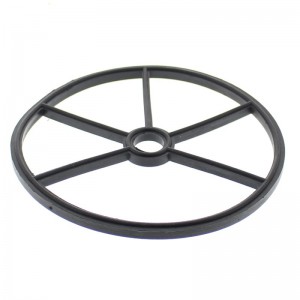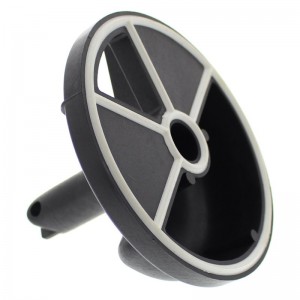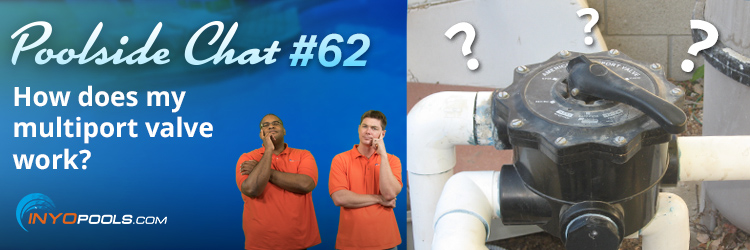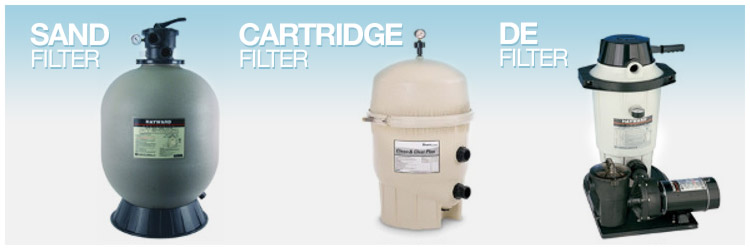Besides having the coolest name in the world of gaskets, this spoked piece of rubber helps our water move where we want, when we want it. The spider gasket is the main diverter seal within your pool’s multiport valve. For homeowners with diatomaceous earth (D.E.) or sand filters, we know the multiport valve as “that thing with the handle”. When we turn the handle on the valve we select Filter, Backwash, or Rinse, and the spider valve is the part making sure water does not lose its way to your desired destination.
 If you are reading this then I will assume you have driven on a highway with those looping interchanges. These sort of winding loopty-loops are confusing but are designed to divert traffic to keep it moving in the correct direction. It is meant to keep the flow moving on time as well. Without these interchanges we would be stuck in traffic grinding our teeth and just downright getting surly. Now imagine your pool plumbing system as that interstate super highway, ten lanes wide and jam-packed with traffic, or in this case pool water.
If you are reading this then I will assume you have driven on a highway with those looping interchanges. These sort of winding loopty-loops are confusing but are designed to divert traffic to keep it moving in the correct direction. It is meant to keep the flow moving on time as well. Without these interchanges we would be stuck in traffic grinding our teeth and just downright getting surly. Now imagine your pool plumbing system as that interstate super highway, ten lanes wide and jam-packed with traffic, or in this case pool water.
Our valve’s pinwheel diverter is the equivalent to those interchanges, ensuring the water is dispersed to the necessary exit. In order for the water current to be routed, this diverter is slotted over assorted pipes with separate ports of call within the filtering system. The open wedge on the pinwheel selects where our water is to be routed. As we swing the handle on the multiport valve, we are able to change the final destination of the water either through the filter for normal operation, backwards for cleaning, or to bypass it completely.
Where does the spider gasket come in to this? If the diverter is the pavement, the spider gasket is the guardrail and lane markers keeping the traffic headed in the correct direction. Its main purpose is to seal the seam between the pinwheel and the base of the multiport valve.

What If My Spider Gasket Is Bad?
When we select a desired path for our water, it surges through our pump, filter and back to the pool. Whilst on this journey, it will find any crack or seam through which to leak out of, thereby causing a pain in the neck for you.
Luckily, a bad spider gasket is a simple diagnosis as it usually identifies itself by a leak from the waste port of the multiport valve. The spokes of the gasket are the last  buffer preventing water from skipping past your designated destination and out your waste port. When they break free, or warp out of the o-ring groove, water exits out the wrong hole
buffer preventing water from skipping past your designated destination and out your waste port. When they break free, or warp out of the o-ring groove, water exits out the wrong hole
The Fix:
This can vary depending on multiport model; some gaskets slide into place with a little lube and then others are glued into the pinwheel which requires disassembling of the valve head. Search your valve model number for the parts breakdown to determine which type you own. Either way though, we have you covered.
Our How To Guide and accompanying video will walk you through step by step on replacing your spider gasket. For a Leak: How to Repair a Leaking Hayward Backwash Valve. For Replacement: How to Replace a Spider Gasket on a Multiport Valve
Thank you for sticking around and reading my blog. If you have any further questions, please give our techs a call at 877-372-6038. We are glad to help!











Oh, and the flow of water does what is should when the pump is off.
Matthew,
Water continues coming out of my waste pipe even with pump off and drained my pool a foot before I noticed the stream. With a multiport valve set to “Waste”, does water continue to flow with the pump off? My filter is above pool water level. My valve also allows water to flow out in the backwash setting, with the pump off.
I believe my multiport valve, and/or spider gasket is defective as this valve is brand new.
Thanks,
Jeff
It sounds very defective; when the pump is off, there should be zero water flow out of any line. Unless it was assembled incorrectly, you would need to contact the outlet from whom you purchased the filter or the manufacturer for a warranty replacement.
Thanks Matthew. Pentair is sending out a new one. I put my old valve on and overnight the water became crystal clear. A two and half week diagnosis and finally a remedy. Who knew a brand new multiport valve would be the cause of summer pool woes. Now I will have a brand new valve that I don’t need.
Thanks again. Love the website. Keep it up
Jeff
I was getting sand in my pool from the returns while on filter setting. I have changed the laterals, backwashes and rinsed new sand. My filter has dumped a very large amount of sand into my pool at both returns. I’m at a loss. Could it be the spider gasket?
A few things to check: Did you use #20 silica sand? Finer sand will be too small for the laterals to sift allowing sand to blow into your pool? Check your sand level to make sure you didn’t add too much. A bad spider gasket can cause some sand spillage into the pool; do you see any water draining from the waste port when you have the valve set for normal filtering?
is it possible that a faulty spider gasket can prevent my pump from keeping a prime?
No, it is not likely. Things to check are listed here: How To Determine Why a Pool Pump Won’t Prime
thank you very much, I will check the impeller for debris.
I did speak with a person at my local pool shop and he thinks that my pump may actually be too weak, or beginning to show signs of failure. I have a sunken above ground pool, he thinks I really should be using an in-ground pool pump rather than an above ground pool pump. does that make sense to you?
A few questions:
Is the Pump below the waterline?
How far away is the pump from the pool?
What is your pool size?
What is the model number of your pump?
Is the Pump below the waterline?
no, definitely above the waterline
How far away is the pump from the pool?
approx. 40′ from pump to skimmer
What is your pool size?
21′
What is the model number of your pump?
Hayward SP56152ET
the pump works, but it just wont completely fill to the top.
Again, I really appreciate the information and help.
Must one bond a spider gasket?
It depends on the model of the multiport valve. Some gaskets are glued into the groove by the manufacturer some are not; but generally, I would use the original gasket installation as the example of what is necessary for your valve.
I have an issue with the filter “being bypassed”. When I vacuum, the algae shoots right back into the pool. The small pipe that sticks down from the valve was cracked, so I replaced it. The laterals and stand pipe are only a year old and don’t show signs of a crack and there is no sand in the pool nor in the yard where I backwash. I have also just replaced the sand, so everything except the filter housing is new and I can’t figure out what to do next.
If it is dead algae, use a clarifier or a flocculant to clump into larger particles the sand filter can catch. If it is live algae, then first you need to kill the algae by shocking the pool, then revert to my first sentence when the pool is no longer green.
I lost 6inches of water overnight. I was starting the slam process in the evening when I woke up the pool lost almost 5inchs of water. Is it possible for it to be the spider gasket when I did backwash then filter there was a noise coming from the mutliport valve
A bad spider gasket would cause water to flow out of the backwash port of the valve even when the filter is set to normal filter mode. Was the source of the leak the backwash port of your multiport valve?
I have learned that my son, who has been “taking care of the pool” this summer, has not been turning the pump off before backwashing. Now we have a very green pool that is not responding to chemicals. Would that be a result of damage that may have been done by him turning the valve without the power being off? If so, what is the fix?
Algae would not be caused by just the spider gasket issue. Algae blooms are caused by a lack of sanitation chemicals or irregular water chemistry.
Have you tested your pool water? If so, what were the results?
I have had a stream of sand that shoots out of my filter,I checked the laterals for cracks and changed My sand but for some reason it has started back again any suggestions?
I have had a stream of sand that shoots out of my filter,I checked the laterals for cracks and changed My sand but for some reason it has started back again any suggestions?
I’m having 2 issues- high pressure (30) and water leaking out the waste/backwash hose when on recirculate. My brother thinks it’s a spider gasket issue. Could a new one solve all my problems?
The backwash issue does like a back spider gasket. The high pressure could be a dirty filter, or old filter media. What was the normal “clean” filter water pressure reading on the gauge?
Normal is 20. I did take apart the filter and clean it and the PSI did not get better, however this morning I ran it on rinse for quite a while and the PSI is now back to 25 at least. I know I also need a new spider gasket. It In going to rinse it a bit more. After I rinse it I need to add more DE right?
When was the last time you gave the grids a chemical soak? Old grid pores can become so caked that backwashing no longer works. A chemical soak should provide your grids the deep clean they likely need.
My return is shooting cloudy water in pool after I vacuum or backwash
A psider gasket is not going to cause cloudy water by itself. A few things need to be answered, is this a sand or de filter; have you checked your chemistry levels; does the cloudiness stay, dissipate, or is there sediment on the pool floor?
I have the same issues during and after vacuuming. I have a sand filter, Hayward, and all chemical levels are in normal range. What we did have that is unusual is a two day rain that had very red fine sand in it. The sand settled on the bottom. I used a fluculant and vacuumed several times times. But each time after about five minutes the returns start getting cloudy. I backwash, repeat vacuuming, and again after five minute same thing. I managed to get most of it out but using the waste setting when vacuuming, but I can not do this and backwashing often as I pay dearly for water and it really gets expensive. I have to have water trucked in….yes….it really get expensive. But even after all that there is a sediment on the bottom that just refuses to clean up no mater how often I vacuum….it just returns it to the pool.
And you’re sure this sand isn’t from the sand filter itself? Maybe caused by a broken lateral or standpipe?
Yes i am sure. I replaced all the sand and cleaned out everything. I backwashed and rinsed the new sand in the filter. I let the filter run for a few hours and then started to vacuum some of the left over sediment on the bottom. It’s a very fine sediment, floats like a cloud at the very bottom. As soon as I start to vacuum it comes back up the return jets. I am stumped….
I am not sure what else to use besides the regular ol’ flocculant which clumps fines particles into bigger chunks so the filter can catch it.
How can I determine which gasket to order? I put in the model number but I can’t seem to find the correct size for my backwash valve.
You would need the model number of the multiport valve to tracking the correct gasket. Or you can compare the dimensions and shape configuration to this spider gasket chart.